 As the end of triathlon season approaches, it’s important to focus on fine-tuning your training and race planning. Whether you’re getting ready for a Championship race or your final fun event, strategic planning becomes crucial to ensure you finish your late season on a high note. Here’s a concise guide to help you stay strong, fast and mentally tough to the end.
As the end of triathlon season approaches, it’s important to focus on fine-tuning your training and race planning. Whether you’re getting ready for a Championship race or your final fun event, strategic planning becomes crucial to ensure you finish your late season on a high note. Here’s a concise guide to help you stay strong, fast and mentally tough to the end.
Reflect and Adapt
Take a moment to review your season’s training and races so far. Identify areas where you’ve excelled and aspects that need improvement. Adjust your training plan accordingly to address weaknesses and build on strengths.
Fine-Tune Nutrition
Refine your nutrition plan for optimal performance. Focus on well-balanced meals, hydration, and race day fueling strategies. Experiment with different nutrition options during training to find what works best for you for both training and racing.
Prioritize Recovery
As the season comes to an end, prioritize recovery more than ever. Sufficient sleep, proper nutrition, and active recovery techniques help with muscle repair and mental rejuvenation. Even if this means adjusting your training plan, recovery is extra important this time of season. Proper recovery sets the stage for future training success. My first season of racing into November, my motivation to train really fell off. I had put a lot of miles “in the bank” through the first 10 months of the season. But, it turned out great because the extra recovery allowed me to still race well late in the season.
Key Workouts
Integrate key workouts that simulate race scenarios. Incorporate plenty of brick sessions to enhance your body’s ability to handle the stresses of transitions. Practice predicted race day conditions as much as possible…. Weather, terrain, etc. Take advantage of good weather conditions to get out and swim in the open water as much as possible. Train at your goal race pace/effort so your body knows what you’re asking it to do.
Effective Tapering
Execute a well-structured taper to peak your performance. Gradually reduce training volume while maintaining frequency and some intensity with good long recovery intervals to ensure you’re at your best on race day. Generally, the longer the race, the longer the taper: for a full distance Ironman, it could be up to 3-4 weeks; for a sprint, it could be a few days to a week. Much depends on your current fitness level.
Manage Intensity
Strive for a balanced intensity level in your workouts. Push yourself without risking burnout. Quality training trumps excessive volume or frequency at this time of year.
Race Strategy
Develop a solid race strategy tailored to your strengths. Plan pacing, plan nutrition, get organized around transition training and racing. It’s great to analyze previous races for insights on where you can make improvements.
Mental Preparation
Cultivate a strong mental game. Visualize successful outcomes, practice positive self-talk, and use mindfulness techniques to manage race day nerves. Visualize your process to achieve all of these goals. Focusing on process goals (strong pull, steady aero position, quick feet, etc) builds into achieving outcome goals. Embrace challenges and maintain a positive attitude. Challenges are opportunities for growth. Approach each workout and race with enthusiasm. Mental strength can be a game changer in the late season races when fatigue sets in.
Know Your Limits
While it’s essential to push yourself, be mindful not to overtrain or take on too much too soon. Balance intensity and volume to prevent burnout. Avoid pushing your body too hard and risking injury. Listen to your body, address any discomfort promptly, adjust training and rest as needed.
Equipment Check
Ensure all of your gear is in top condition. Inspect your bike, wetsuit and other accessories to prevent surprises on race day. Make sure your bike is clean. A week or so out from your race is a great time for a tune up, to replace worn tires or an old helmet.
Support System
Surround yourself with a supportive, positive network of friends and family who share your enthusiasm for your goals and dreams. Training partners, friends and family can provide encouragement during tough times.
Celebrate Progress
Acknowledge your achievements regardless of the outcome. Celebrate the hard work you’ve put in throughout the season.
Stay Consistent
Consistency is key! Stay committed to your training and strategies until the end. Dedication pays off.
With these end of season strategies, you’ll be well equipped to finish your race season strong, fast and proud of your accomplishments. Remember, it’s the culmination of your training, preparation, and mindset that will define your success. Best of luck!







